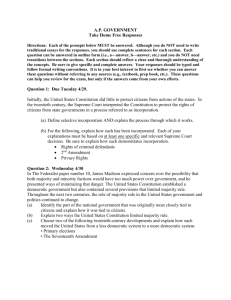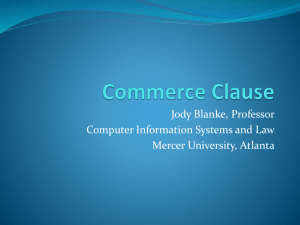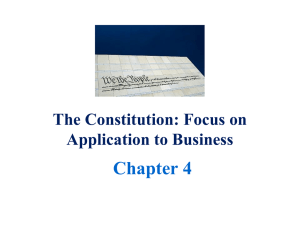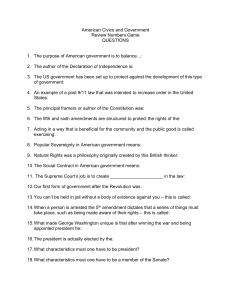File
advertisement
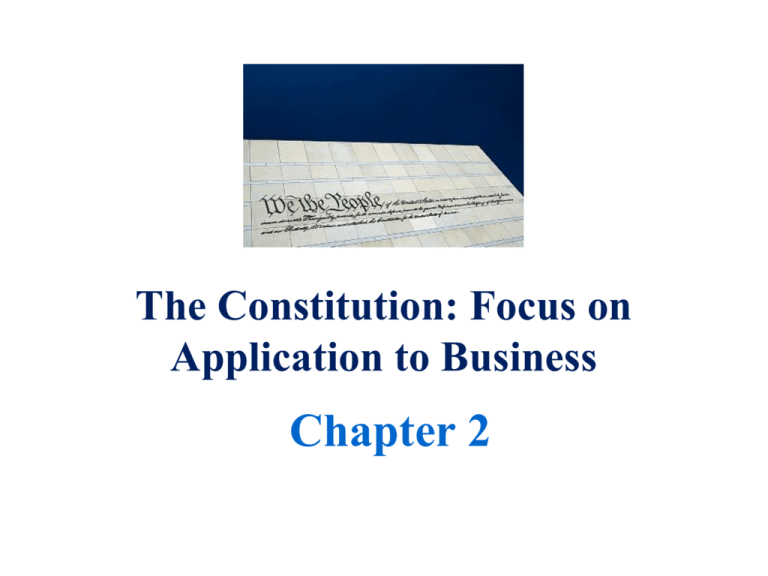
The Constitution: Focus on Application to Business Chapter 2 The Constitution of the United States • “We the people of the United States, in Order to form a more perfect a Union, establish Justice, insure domestic Tranquility, provide for the common defence, promote the general Welfare, and secure the Blessings of Liberty to ourselves and our Posterity, do ordain and establish this Constitution for the United States of America.” • See Appendix C Articles of the Constitution • • • • • • I. Composition and powers of Congress II. Selection and powers of the President III. Creation and powers of the federal judiciary IV. Role of the states in the federal system V. Methods of amending the Constitution VI. Declaring the Constitution to be supreme law of the land • VII. Method for ratifying the Constitution Constitutional Amendments • Amendments began almost immediately after Constitution was ratified. • In 1791 the first 10 amendments were ratified by the States. These are called the Bill of Rights. • A proposed amendment must be passed by 2/3 vote in the House and Senate • Then ratified by 3/4 of state legislatures OR • May be proposed by 2/3 of state legislatures by calling for a constitutional convention – This must be ratified by 3/4 of state legislatures COMMERCE CLAUSE Art. I, Section 8 • Congress has power: “Regulate Commerce w/foreign Nations & among the several States, and w/the Indian Tribes” • Deals with “interstate commerce” Necessary and Proper Clause (Clause 18, Article I, Section 8) • Constitution enumerates list of Congressional powers - AND • Power “to make all Laws which shall be necessary and proper for carrying into Execution the forgoing Powers…” • This power with the Commerce Clause provides BROAD Congressional control of commerce. • Most laws are necessary and proper! McCulloch v. Maryland (1819) • Can Congress establish a National Bank? • Yes, it is constitutional under the Necessary and Proper clause, which EXPANDS, not restricts, Congress’s powers • Federal actions take precedence over actions of other governments under Federal Supremacy clause • Maryland wanted to regulate National Bank • NO. Violates Supremacy Clause Federal Supremacy: The Supremacy Clause Article VI, Paragraph 2 • “The Constitution, and the Laws of the United States . . . Shall be the supreme Law of the Land; and the judges in every State shall be bound thereby. . . . “ • McCulloch v. Maryland states that when the federal government has power to act under the Constitution, its actions are “supreme”. • In such a case, federal government actions take precedence over actions of other governments. Wickard v. Filburn (1942) • Federal controls on production of wheat • Small farm in Ohio produces 239 bushels more than the farmer, Filburn, was allowed • He is fined $117 and ordered not to plant more • Filburn argues that production used to feed his chickens and cows and for making bread – all for consumption on farm • HELD: Although this appears “intrastate” & “trivial” • STILL, all small farmers together would impact “interstate” commerce and “market conditions” • Congress may regulate production • Note: Almost all commerce is defined as “interstate” Katzenbach v. McClung (Use of Commerce Clause in Nondiscrimination) 1964 Case • • • • Ollie’s Bar-B-Q Family-owned restaurant in Birmingham, AL 220 seats for white customers only New Title II of 1964 Civil Rights Act prohibits racial segregation in public accommodations if serving interstate travelers or if food moved in interstate commerce • Does Title II apply to a local business? • HELD: Yes, activity may “exert a substantial economic effect on interstate commerce.” Federal and State Regulatory Relations Versus • If states legislate on a matter on which Congress has legislated: • Federal regulation takes precedence over state regulation. • State regulations may not contradict federal law standards. • State may not enact laws that burden interstate commerce by imposing restrictions on business from other states. • See Exhibit 4.1 Great Constitutional Moments Bibb v. Navajo Freight Lines • Arkansas required trucks to have straight mud flaps • Illinois required trucks to have mudguards that “contour the rear wheel, with inside surface being relative parallel to the top 90 degrees of the rear and 180 degrees of the whole surface . . . . and must be installed not more than 6 inches from the tire surface . . . and must have a lip or flange on its outer edge of not less than 2 inches.” • Trucks ticketed in Illinois for having the wrong flap • Held: Supreme Court said Arkansas flaps were more common. Illinois mudguard law is a burden on interstate movement. When State Law Impedes Interstate Commerce • Southern Railway Co v. Arizona – Court struck • Chemical Waste down Az law that required Management v. Hunt – trains to be shortened for Violates Commerce clause to safety reasons. charge more for out-of-state • Rowe v. NH Motor generated hazardous waste Transport – Ct. struck than for in state waste down a ME law requiring • Wyoming v. Oklahoma – Ok companies shipping law requiring coal-burning tobacco products into power plants to burn at least state to confirm that 10% Ok-mined coal was recipients are of legal age. discriminatory & interfered U.S. Statutes specifically with interstate commerce. prohibit this state action. Hughes v. Oklahoma • Oklahoma prohibits shipping or selling minnows out of state to protect Oklahoma minnows. • Hughes bought minnows in OK and took them to Texas. Convicted of violating OK state law. Appealed. • OK Supreme Court upheld statute as constitutional to protect OK natural resources. Hughes appealed. • U.S. Supreme Court: Reversed in favor of Hughes. • Established three part test to use in such cases: 1) Does statute regulate evenhandedly with only “incidental” effects on interstate commerce? 2) Does statute serve a legitimate local purpose? If so, 3) Could alternative means promote this local purpose as well without discriminating against interstate commerce? • Fine to protect wildlife, but could be done in less discriminatory way by the state Imitation Not Allowed • States may not copy federal regulations if imitation inhibits interstate commerce. • South-Central Timber Development v. Wunnicke (S.Ct.) – Commerce clause long recognized as limiting power of states to pass laws “imposing substantial burdens on such [interstate and foreign] commerce.” – This power is granted only to Congress. Taxing Power Art. I, Section 8, Clause 1 • “lay & collect taxes” • 16th Amendment gave federal government power to impose income taxes • Taxes used to raise revenue and /or deter/punish/encourage certain behavior • Supreme Court: “the power to tax includes the power to destroy” • Supreme Court: Upheld taxes on illegal gambling, narcotics & marijuana (illegal business activities) – If reported: evidence of illegal activity – If don’t report, violate tax laws State Taxation • • State taxes cannot impede interstate or international commerce. Baccus Imports v. Dias: Court struck down Hawaii’s 20% tax on all alcoholic beverages except for local products. – • Davis v. Michigan Dept. of Treasury: Michigan exemption from state income taxed the retirement benefits paid to state employees. – – • • • All other retirement income (i.e. federal government employees’ benefits) were taxed. Taxes must apply equally to all retirement benefits. Quill Corp. v. North Dakota: State sales taxes imposed on out-of-state firms doing mail-order business with ND residents were stricken – • Same tax must be imposed regardless of origin. Must have a physical presence in the state to be taxed Goldberg v. Sweet: 5% tax on long-distances calls to or from the state unless taxpayer can show that another state has billed the call, then the IL tax is refunded. Violation of commerce clause. Controversial area: States ability to tax internet businesses such as Amazon.com Apportioning state tax burden: Supreme Court held business income may be taxed by states as long as they use formulas that divide a company’s income fairly in the portion attributable to its state. Business and Free Speech U.S. First Amendment Freedom of Speech • Commercial Speech (advertisements) • Political statements by corporations (public issues) • Usually allowed • UNLESS “compelling state interest” to prohibit • (For example: public safety or health) • Supreme Court struck down parts of McCainFeingold Act prohibiting for-profit and non-profit corporations & unions from broadcasting “electioneering communications” • See Consolidated Edison case (business & political speech) • See also Central Hudson case (business and commercial speech) International Freedom of Speech • All other countries have more restrictive practices in freedom of speech in the media – In United Kingdom, politicians can successfully sue the media for defamation – In many European countries, books that contain hateful material may not be published – In Belgium, journalists must reveal their sources – Reporter for leading German magazine, Die Stern arrested in Brussels in 2004 for publishing articles alleging that members of European Parliament engaged in fraud Cookies Crushed By 1st Amendment • Zion Methodist Church arranged months in advance to hold a bake sale at Chippewa County, Wisconsin courthouse • As time drew near, County legal experts decided having church cookies sold in the courthouse would violate 1st Amendment – Requirement of the separation of church and state • County Administrator said he felt like “The Grinch Who Stole Christmas” • But, the law is the law. Bake sale held elsewhere. • Revenues were reported to be lower than expected. Cyberlaw: “Freedom of Speech on the Net” • American Civil Liberties Union of Georgia v. Miller • Georgia statute makes it a crime for “any person . . . knowingly to transmit any data through a computer network . . . if such data uses an individual name . . . to falsely identify the person.” • Violated the 1st Amendment • Statute was too sweeping in it’s coverage. • Reno v. American Civil Liberties Union • Supreme Court struck down the Communications Decency Act of 1996 • Purpose of law was to restrict pornography for children on the Web • Law went too far restricting 1st Amendment rights • It was like “burning the house to roast the pig.” Consolidated Edison Co. v. Public Service Commission of NY • Con Ed mailed statement supporting nuclear power in monthly electric bill to customers • Public Service Comm. of NY said: Can’t do that as customers are captive audience and should not be subjected to Con Ed’s views • HELD: Supreme Court reversed in favor of Con Ed • Test: Was the state’s prohibition 1) reasonable as to time, place & manner of speech? 2) concerning a permissible subject matter? 3) “narrowly-tailored” to serve a “compelling state interest”? • This is not a captive audience. Customers may choose not to be exposed by not reading material or throwing away. S.Ct.: Business & Commercial Speech • Shapiro v. Kentucky Bar • Bigelow v. Virginia: Court Assn.: Held state bar reversed conviction of VA violated 1st Amendment by newspaper editor who restrictions on advertising published ads re: for professionals services availability of low-cost (e.g. lawyers or doctors) abortions in NYC • Trustees of the SUNY v. • Virginia State Bd. Of Fox: Standard for judging Pharmacy v. Virginia commercial speech Citizens Consumer regulation is one that is Council: Struck down VA “not necessarily perfect law prohibiting advertising but reasonable” and of prices of prescription “narrowly tailored to drugs. achieve the desired objective.” Central Hudson Gas & Electric v. Public Service Comm. of New York • The NY Public Service Commission ordered the end of advertising that promoted the use of electricity as contrary to public interest. • U.S. Supreme Court HELD: Although commercial speech does receive lesser protection than other guaranteed expressions – The ban more extensive than necessary to achieve the state’s objective, so unconstitutional. Test: 1. Is regulated speech lawful and truthful? 2. Is there a substantial government interest to advance? 3. Regulation directly advance government interest? 4. Regulation no more than is necessary to serve public interest? • Reversed in favor of Central Hudson “Freedom of Bark But Not Burn in Ohio” • Police dog was sitting in an unattended police car • Gilchrist was charged with taunting the dog • He argued, not taunting but engaged in “unrestrained late-night enthusiasm” • (Besides, the dog barked first) • Ohio appeals court upheld dismissal of charges • ANOTHER Ohio appeals court held that: – Burning a rainbow flag at a gay pride parade was not protected speech – Burners did not obtain a burn permit first – Requiring the permit is “unquestionably within the city’s constitutional power” Freedom To Criticize Freedom of speech vs. disparagement • Bose Corp. v. Consumers Union – Consumer’s Report gave bad review of Bose speakers. – Product disparagement or truthful reporting? – To show defamation must show actual malice in publishing a knowing and reckless falsehood. – Supreme Court HELD: Okay since no MALICE Internet Based Free Speech • Federal Appeals Courts: Have held Web sites dedicated to mocking or posting negative opinions about business are protected speech • Must show actual malice regarding an actual falsehood See Test Yourself, p. 102 The (Partially) Unwritten Constitution of the United Kingdom • Unlike U.S. Constitution, the UK constitution is made of a collection of laws, treaties, statutes and unwritten principles • Law making up constitution of UK are no different from Parliamentary Acts – The “c” of constitution of UK not even capitalized – They can be amended by Parliament at any time • UK constitution has two central principles – The rule of law – Supremacy of Parliament • Parliament is supreme – Different from the separation of powers in the U.S. Constitution • The majority of votes in Parliament can do almost anything it wishes – Limited by tradition & popular opinion (Continued) The (Partially) Unwritten Constitution of the United Kingdom, cont. Key parts to the constitution of the United Kingdom • • • • • • • Magna Carta (1215): Limits monarch’s power over the nobility – Protects against imprisonment or takings without judgment by one’s equals. – No delay of justice Bill of Right (1689): Prohibits monarch from interfering with the law Act of Settlement (1701:) Established succession to British throne – Still bars Roman Catholics from the throne Act of Union (1707): United England and Wales with Scotland – Scottish National Party trying to undo this Constitution of UK much different than it was 100 years ago. In U.S., a law may be declared “unconstitutional” In UK if there is an “incompatibility” with the constitution, statute is not stricken from the books – Instead creates an unenforceable obligation on the government to alter it to conform to the law 2nd Amendment Right to Bear Arms • Restrictions government may place on gun ownership & possession – not settled area – Some jurisdictions (i.e. NYC) have very tight controls – Others do not • Some employers & business ban the possession of firearms anywhere on company property • State of Oklahoma: Passed statute prohibiting employers from preventing employees from storing firearms in their personal, locked vehicles on company property 4th Amendment – Unreasonable Search & Seizure “The right of the people to be secure in their persons, houses, papers and effects, against unreasonable searches and seizures, shall not be violated, and no Warrants shall issue but upon probable cause….” • • • • • Does government (i.e. OSHA) need warrant? Usually yes Exception: closely regulated businesses However, business usually agrees to search Generally, closed places such as homes and businesses are not subject to random police searches • See also Cyberlaw: No Right of Privacy in Chat Rooms” – Messages sent to chat rooms lose their privacy and can be used as evidence in child pornography case Limits of Searches & Inspections • Government inspectors who come to business for a warrantless inspection • Marshall v. Barlow – OSHA inspector asks to search work areas. – Barlow refused admission unless inspector got a warrant. – HELD: Inspector must get a warrant. • Skinner v. Railway Labor Executives’ Assn. RR employees involved in train accidents or safety violations can be searched for alcohol or drugs – closely regulated industry New York v. Burger (in text) • Junkyard is searched without warrant under NY statutory scheme; stolen cars and parts are found • Owner tries to keep evidence out of trial as an unconstitutional search • To be okay for warrantless search: – must have substantial government interest – searches necessary to further regulatory scheme – must have adequate substitute for a warrant (must advise owner and define scope) • HELD: Search is constitutional as furthering NY statutory concerns regarding car theft 5th Amendment-Right Against Self Incrimination “No person shall be. . . compelled in any criminal case to be a witness against himself.” • Does self-reporting violate 5th Amendment? – Applies to PEOPLE, not Corporations – Braswell v. U.S.: President & sole stockholder must report, even if it incriminates him – But in practice business records tied to persons 5th Amendment – Just Compensation or Takings Clause “nor shall private property be taken for public use, without just compensation.” • Can government take property for public purposes – oil pipelines, military bases, highways, sidewalks? Yes. • Eminent domain – the right of governments to condemn private property for public uses • What is “just” compensation? Usually “fair market value”. • Destruction of property value through takings must be almost complete to receive compensation – i.e. 60% devaluation due to change in zoning laws does not require governmental compensation to affected owners. • Controversial economic development tactics: City uses power to piece together land desired by a private developer – legal in some states; illegal in others • See Kelo v. City of New London, Connecticut Kelo v. City of New London, Connecticut • City of New London worked on plan to piece together property along riverfront for upscale housing, a new shopping center, and a facility for Pfizer Company. • Some home owners refused to sell, including Suzette Kelo, who wanted to keep her water-front home, and Wilhemina Dery who was born in her home in 1918 and lived there all of her life. • City used power of eminent domain to buy property and sell to developers. • Homeowners claimed this was a 5th Amendment violation of “public use”. • Connecticut courts held the taking was proper and home owners appealed. (continued) Kelo v. City of New London, Connecticut • ISSUE Does the City’s development plan serve a “public purpose”? • This court favored giving legislatures broad latitude in determining the public needs through takings. • Court will defer to the city’s determination for the need for “economic rejuvenation.” • Look at benefits to the community, such as new jobs, increased tax revenue. • HELD: The takings that are challenged satisfy the Fifth Amendment requirements of takings for a public purpose. City wins. 6th, 7th & 8th Amendments 6th Right to trial by jury in criminal cases 7th Right to trial by jury in common law cases 8th Limits cruel & unusual punishments and excessive fines U.S. v. Bajakajian (in text) Bajakajians were leaving the country with $357,144 cash. Money was legally earned. Taking money to repay relatives who helped them start their business. They could take the money out of the country, but failed to report they were leaving with more than $10,000. Government seized all their money for “not reporting the fact.” Court held: This was an “excessive fine” violating the 8th Amendment. Was grossly disproportional to the seriousness of the offense. 14th Amendment: Due Process Clause and Equal Protection Clause • “No state . . . shall deprive any person of life, liberty or property without due process of law; • “nor deny to any person within its jurisdiction the equal protection of the laws.” • 14th Amendment incorporates protections from the Bill of Rights & applies them to state governments. • Due process: violated when state infringes on fundamental liberty interests without narrowly tailoring to meet the compelling state interest; is offended when state action shocks the conscience or offends judicial notions of fairness and human dignity • Equal protection: state governments must treat people equally Pro’s Sports Bar & Grill v. City of Country Club Hills • Pro’s Sports Bar & Grill received a Class A liquor license from City of Country Club Hills (suburb of Chicago) – Allowed Pro’s to stay open until 2 AM Monday – Fridays – Open until 3:00 AM Saturdays and Sundays • Next year, owners reapplied for renewal. • City council decided (without hearing or vote) to change liquor license to require Pro’s to close at 11:30 PM on weekdays & 12:30 AM on the week-end. • Owners protested – would have terrible impact on business • Sued City • District court issued a temporary injunction against City’s enforcement of new license • Court said there was a violation of due process. • City appealed. (Continued) . Pro’s Sports Bar & Grill v. City of Country Club Hills, cont. • Two questions – Whether plaintiffs were deprived of a protected liberty or property interest. – If so, whether deprivation occurred without due process. • When license was granted, this is a form of property under “due process.” • Like a revocation of an existing license, nonrenewal requires cause and a hearing • Pro’s did not receive a pre-deprivation hearing or other protections of the revocation process. • Irreparable harm to Pro’s outweighs any interest in city. • HELD: Preliminary injunction against the City’s actions upheld. “Drop That Fry! Hands Over Your Head!” • 12-year-old Ansche Hedgepeth was arrested for eating French fries at a Washington D.C. subway (Metro) station. • Violation of Metro rules • She was searched; arms handcuffed behind her back; shoelaces removed. • Released to her mother several hours later • She sued for violation of equal protection • HELD: She lost. • “There is no fundamental right to freedom from physical restraint in cases where probable cause for arrest is present.” Reget v. City of La Crosse • • • • • • • • • • • • Reget owned John’s Auto Body in La Cross, Wisconsin since 1975. City ordinance: If you have 2 or more junked vehicles stored outdoors for more than 30 days, you were a junk dealer. Had to build a fence to hide vehicles. Reget received several citations for failure to build fence. He said that rule was unfair as it applied only to him. In 1996, City wanted to rezone Reget’s property from “heavy industrial” to “commercial” – would force him to move his business. Reget and City fought. City agreed that Reget could stay if he built a fence & complied w/ noise ordinance. Reget again complained that City was selectively enforcing its ordinance. City agreed to enforce its ordinances if they were violated by other businesses in the area. In 2003, no fence; city issued another citation. Reget agreed to let City install a fence and to repay city for the costs over time City then dismissed the citation. In 2006, Reget sued City and officials for violating his equal-protection rights by selectively enforcing its ordinance him and by targeting him for rezoning. (Continued) Reget v. City of La Crosse, cont. • • • • • • • • • • • • • District Court granted summary judgment for City. Reget appealed. HELD: Affirmed Summary judgment for City, and dismissed Reget’s claims Equal protection is violation if there is so-called “class of one” Plaintiff must prove: – 1) state actor intentional treated him different than others similarly situated AND – 2) there is no rational basis the difference in treatment. Reget’s argument fails with first step of analysis. Other individuals compared to Reget must be identical or directly comparable to him in all material aspects. Reget did not produce evidence that other businesses failed to comply with fence requirement. No evidence that other dealers in some other way yet were not cited. Three citations against Reget were dismissed – unlike other junk dealers. Reget volunteered to build fence with settlement of his rezoning dispute. This voluntary agreement cannot support a class-of-one claim. No evidence that City singled him out for rezoning. City rezoned more than 100 properties as part of rezoning project.


